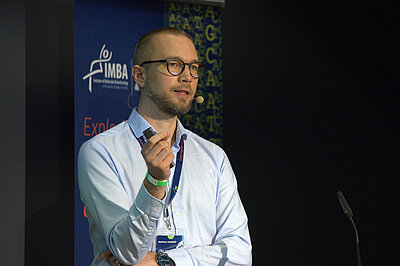Matthias Samwer, former Postdoc
Matthias Samwer was a member of Daniel Gerlich’s group from 2009 to 2013, where he studied how the set of chromosomes that forms separate bodies in dividing cells is packaged into a single cell nucleus after the completion of cell division. Samwer is currently a Scientific Director in the Cancer Cell Signaling Department at Boehringer Ingelheim in Vienna, where he works on target identification and validation in the early oncology pipeline.
We sat down with Matthias Samwer to talk about hisexperience at IMBA and how the institute contributed to his successful scientific career.
Given the large degree of research freedom I enjoyed, it felt like the only limits to making discoveries were time and my own abilities. During my stay at IMBA I also connected with a lot of great scientists at IMBA and IMP, a few of which became colleagues in my new position at Boehringer Ingelheim. This highlights the kind of powerful network that you can build at IMBA.
The team spirit in the Gerlich lab, which was strongly fostered by Claudia, our lab manager. We would have a coffee round every morning at 10 a.m., which built a great sense of community.
IMBA taught me that a group of talented researchers can get a project further than any individual alone ever could. And while a postdoctoral researcher is still highly responsible for driving their own project, at IMBA there are numerous people that can and will help you to get further. In drug discovery, where I’m working now, this is even more important. Assembly and leadership of a highly functional team is one of the key skills to make any project progress.
I learned a lot about stringent scientific thinking from the discussions with other scientists. Also, I learned how to present a project in a crisp and comprehensive way so that other scientists can relate to it and get engaged in a discussion. Both skills help me in my current position, where I also regularly present projects from various areas of cancer biology to audiences with very divergent levels of background knowledge.
My best memory is from when I was writing my manuscript and teamed up with other postdocs that were at a similar stage in their projects. We discussed our data and several storylines back and forth until we found something that worked for each of us. It was a very rewarding experience.
The Friday afternoon social hours were a great experience. This kind of weekly event is really something special about IMBA and the Vienna BioCenter, where you can just informally connect with great minds, pitch them some of your science and just get into a great conversation. Many times, I would walk away with great new ideas.
